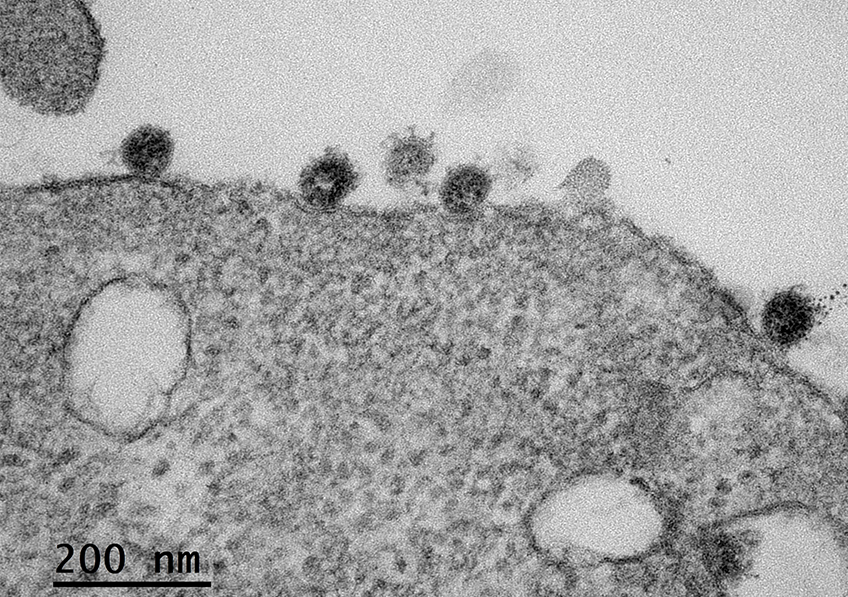
SARS-CoV-2 infected cell © Sébastien Eymieux and Philippe Roingeard, INSERM – Université de Tours
What are the factors predicting progression to severe forms of COVID-19? One year into the pandemic, this question remains a key research subject, and one that scientists from Inserm and Université de Paris decided to explore further by studying the link between viral kinetics and disease progression. This research is based on data from the Inserm-sponsored French COVID cohort, and has been published in PNAS.
While some patients infected with SARS-CoV-2 only have mild symptoms of COVID-19, a minority will go on to develop severe forms of the disease. A better understanding of the factors that determine this progression is essential if we are to improve their treatment and reduce mortality.
A team led by Inserm researcher Jérémie Guedj at the IAME laboratory (Inserm/Université de Paris) analyzed the biological data of 655 patients hospitalized for SARS-CoV-2 infection, and who were participants in the French COVID cohort.
The aim was to help elucidate the link between viral kinetics – the amount of virus present in the nasopharyngeal compartment over time – and the progression of the disease.
Their study has highlighted two essential points. The first is that the older the patient, the longer he or she takes to eliminate the viral load from the nasopharyngeal compartment. The second is that this viral dynamic is associated with mortality.
While viral load is certainly not the only factor in progression to severe disease and death, it does play an important role. Although COVID-19 is often described as an inflammatory disease, these virological aspects must also be taken into account in the treatment and support of hospitalized patients.
As a consequence, this research also highlights the need for continued research into the development of antiviral treatments.
In particular, the scientists used modeling to show that shortening the time to viral clearance by administering treatment upon hospitalization could significantly improve prognosis, especially in the most elderly.
These contents could be interesting :
Modeling SARS-1 CoV-2 viral kinetics and association with mortality in hospitalized patients: results from the French Covid-19 cohort
PNAS, février 2021.
Nadège Néant1*, Guillaume Lingas1*, Quentin Le Hingrat1,2*, Jade Ghosn1,3, Ilka Engelmann4 , Quentin Lepiller5, Alexandre Gaymard6,7, Virginie Ferré8, Cédric Hartard9, Jean-Christophe Plantier10 ,Vincent Thibault11, Julien Marlet12,13, Brigitte Montes14, Kevin Bouiller15, François-Xavier Lescure3 ,Jean-François Timsit16, Emmanuel Faure17, Julien Poissy18, Christian Chidiac19, François Raffi20,21 ,Antoine Kimmoun22, Manuel Etienne23, Jean-Christophe Richard24, Pierre Tattevin25, Denis Garot26 ,Vincent Le Moing27, Delphine Bachelet28, Coralie Tardivon28, Xavier Duval1,28, Yazdan Yazdanpanah1,3, France Mentré1,28, Cédric Laouénan1,28*, Benoit Visseaux1,2*, Jérémie Guedj1,10 *, for the French COVID cohort investigators and study group
- Université de Paris, IAME, INSERM, F-75018 Paris, France
2 AP-HP, Bichat Claude Bernard Hospital, Virology Department, 75018 Paris, France
3 AP-HP, Bichat Claude Bernard Hospital, Tropical and infectious diseases Department, 75018 Paris, France
4 Virology Laboratory, Institute of Microbiology, CHU Lille, Univ. Lille, Lille cedex, France
5 Laboratoire de Virologie, Centre-Hospitalier Universitaire de Besançon, 25000 Besançon, France
6 Laboratoire de Virologie, Institut des Agents Infectieux (IAI), Hospices Civils de Lyon, Groupement Hospitalier Nord, 69004 Lyon, France.
7 Centre National de Référence des Virus Respiratoires, Hospices Civils de Lyon, Groupement Hospitalier Nord, 69004 Lyon, France.
8 CHU Nantes, Virology, Nantes, France
9 Laboratoire de Microbiologie, CHRU Nancy, 54000 Nancy, France
9bis Université de Lorraine, CNRS, LCPME, 54000 Nancy, France
10 Normandie University, UNIROUEN Rouen, EA2656, Rouen University Hospital, Virology, Rouen, France.
11 Virology, Pontchaillou University Hospital, rue Le Guilloux, 35033 Rennes cedex, France
12 Laboratoire de Virologie, CHU Bretonneau, 37044 Tours, France
13 INSERM UMR 1259, Université de Tours, 37044 Tours, France
14 CHU Montpellier, Virology, Montpellier, France
15 Infectious and tropical disease Department, Besancon University Hospital, Besancon, France; UMR CNRS 6249, Chrono environnement, University of Bourgogne Franche-Comté
16 Medical and Infectious Diseases Intensive Care Unit, Assistance Publique-Hôpitaux de Paris, Bichat-Claude Bernard University Hospital, Paris, France
17 CHU Lille, Univ. Lille, Infectious Disease Department, CNRS, Inserm, U1019-UMR9017-CIIL, F-59000 Lille, France
18 Université de Lille, Inserm U1285, CHU Lille, Pôle de réanimation, CNRS, UMR 8576-UGSF-Unité de Glycobiologie Structurale et Fonctionnelle, France 19: Infectious and tropical disease department, Croix-Rousse hospital, University Hospital of Lyon
20 Service de Maladies Infectieuses et Tropicales, CHU de Nantes, 44093, Nantes, France
21 CIC UIC 1413 INSERM, CHU de Nantes, 44093, Nantes, France
22 Université de Lorraine, CHRU de Nancy, INSERM U1116, F-CRIN INICRCT, Service de Médecine Intensive et Réanimation Brabois, Nancy, France
23 Infectious Diseases Department, Rouen University Hospital, Rouen, France
24 Lyon University, CREATIS, CNRS UMR5220, Inserm U1044, INSA, Lyon, France; Intensive Care Unit, Hospices Civils de Lyon, Lyon, France
25 Infectious Diseases and Intensive Care Unit, Pontchaillou University Hospital, Rennes, France
26 CHRU Tours, Service de Médecine Intensive Réanimation, 2 Bd Tonnellé, F-37044, Tours Cedex 9, France
27 Tropical and Infectious Diseases, Saint Eloi Hospital, Univ Montpellier, Medical School, Montpellier University Hospital, Montpellier cedex 5, France
28 INSERM, Centre d’Investigation clinique 1425, Hôpital Bichat Paris, France

